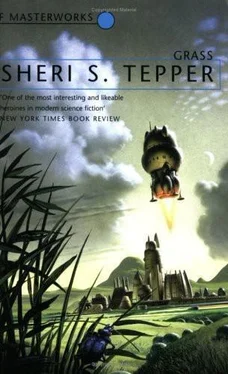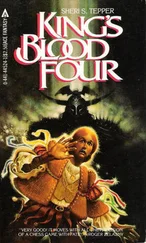Sheri Tepper - Grass
Здесь есть возможность читать онлайн «Sheri Tepper - Grass» весь текст электронной книги совершенно бесплатно (целиком полную версию без сокращений). В некоторых случаях можно слушать аудио, скачать через торрент в формате fb2 и присутствует краткое содержание. Город: London, Год выпуска: 2002, ISBN: 2002, Издательство: Gollancz, Жанр: Фантастика и фэнтези, на английском языке. Описание произведения, (предисловие) а так же отзывы посетителей доступны на портале библиотеки ЛибКат.
- Название:Grass
- Автор:
- Издательство:Gollancz
- Жанр:
- Год:2002
- Город:London
- ISBN:9781857987980
- Рейтинг книги:4 / 5. Голосов: 1
-
Избранное:Добавить в избранное
- Отзывы:
-
Ваша оценка:
- 80
- 1
- 2
- 3
- 4
- 5
Grass: краткое содержание, описание и аннотация
Предлагаем к чтению аннотацию, описание, краткое содержание или предисловие (зависит от того, что написал сам автор книги «Grass»). Если вы не нашли необходимую информацию о книге — напишите в комментариях, мы постараемся отыскать её.
Grass — читать онлайн бесплатно полную книгу (весь текст) целиком
Ниже представлен текст книги, разбитый по страницам. Система сохранения места последней прочитанной страницы, позволяет с удобством читать онлайн бесплатно книгу «Grass», без необходимости каждый раз заново искать на чём Вы остановились. Поставьте закладку, и сможете в любой момент перейти на страницу, на которой закончили чтение.
Интервал:
Закладка:
And the smell. Every night, rising at him out of the cellar below him. A terrible stink. Worse than any bathroom stink. “Oh, oh, no,” said the parrot. “Oh. God. No.” Dad changed rooms with Rillibee. Days went by and Rillibee never really saw her after that. He lay there in Dad’s bed at night, trying to remember what she had looked like. He couldn’t remember. He wanted to see the picture of her, the one over the fireplace.
In the living room, he turned on one lamp and looked up at the picture. She smiled down at him, out of the paint, her shiny hair falling over her forehead, her lips curved.
“Let me die,” whispered the parrot. “Oh, please, please, let me die.”
“Shut up,” Rillibee screamed at it silently, the words pushing out of him like huge, burning pieces of vomit. “Shut up, shut up.”
He told himself he wouldn’t go in there anymore. He wouldn’t listen to that bird anymore. He ate in the kitchen. He did his school-work. He didn’t ask any questions. He didn’t talk about Mom.
“That must have been hard,” said Brother Mainoa. “Oh, that must have been hard.”
“I couldn’t stop thinking about her. I couldn’t. Her face would come into my mind, but then it would turn gray at the edges, starting to curl, like a picture burning, and I couldn’t see what she looked like, couldn’t remember what she looked like. I stood it as long as I could, and then went into the living room once more to look at the painting of her.
“The parrot said, ‘Kill me. Please, please, kill me.’”
It was the day after that, Rillibee’s twelfth birthday, that he woke up knowing it had all been a dream. The sun poured through his window, heartbreak gold. He got up and dressed and plunged out into the living room. The parrot was walking up and down its perch saying, “Thank God. Thank God. Thank God.”
Song was already there, sitting at the table. There was a package wrapped at his place. He sat down and grinned at it, turning it over and over, shaking it to guess what was inside.
“Happy birthday, Rillibee,” Dad said from the kitchen door. “I’m making pancakes.” His voice sounded funny, but the words were all right.
“Happy birthday, Rillibee,” said Song. She sounded like a recording.
Dad came in with a pitcher of juice and leaned over the table to pour it.
There was a sore on the side of Dad’s neck, toward the back. Little. The size of a peanut. Like the sore had been on Mom’s arm. When Dad went back to the kitchen, Rillibee tried to tell Song, but Song just sat there, frozen, not saying anything at all. Then he noticed the bandage on her hand and wondered how long it had been there without his seeing it.
He got up without opening the package and went out of the house, through the orchard to the groves, and down through all of them, the trees getting tinier and tiner the farther he went, until he came to the place where there was nothing growing at all…
“Did you ever see them again?” asked Brother Mainoa. There was a long silence. Rillibee was staring out the window, mouth slightly open, tears washing his face. “I went crazy in school and started yelling something. That night when I got home, there was no one there, just the man from Sanctity, who said to come along with him. I was going to be an acolyte, he said. They never said anything about Miriam or Joshua or Song. When I asked, they told me my people had died a long time ago, that I’d just forgotten. They never even asked if my family was Sanctity. We weren’t. I’m still not.” Brother Mainoa sipped at his own broth, occasionally slapping at a control button that kept threatening to disengage itself. “Brother Lourai — how does that sound?”
“How should it sound?”
“Well, the I sound is for patience, and the r sound is for perseverance. I thought you could use a little of that.”
“What does the m sound in Mainoa mean?” Rillibee asked tiredly. “And the n?”
“Resignation.” murmured the other. “And reliability.”
“Rebellion, did you say?”
“Shush, youngster. Lourai’s a good name. You should hear some of the throat-stoppers Acceptable Doctrine comes up with from time to time. Fouyaisoa Sheefua. How would you like that? Foh-oo-yah-ee-soh-ah Shee-foo-ah. Or Thoirae Yoanee. You wouldn’t want something like that hung on you. Lourai. That’s good enough.”
“What’s acceptable doctrine?”
“Acceptable Doctrine?” Brother Mainoa asked. He took the empty cups away and put them down the recycler. “Well, if you’d been a little older before they dragged you off to Sanctity, you’d have learned what the Office of Security and Acceptable Doctrine is. That’s the group of enlightened ones who tell us what we can believe and what we can’t and make sure we do it. Here on Grass they’re headed up by Elder Brother Jhamlees Zoe, with Elder Brother Noazee Fuasoi as his next man.”
“Like the Hierophants,” cried Rillibee. “God, I wish I could get away from that.”
“You can. Just walk off the site into the grasses, any day. Put your shovel or your soil stabilizer down and go. Nobody’ll come after you. I could’ve done that lots of times, but I always knew there’d be something interesting in the next shovelful, something intriguing behind the next bit of wall, so I don’t. All in all, I’m glad to be here rather than there. Maybe you will be, too. Just bow your head and say, ‘Yes, Elder Brother,’ in a nice obedient tone, kind of sorrowful, and they’ll let you alone.”
“How can you do that?” Rillibee asked scornfully. “It’s dishonest.”
Brother Mainoa seated himself at the controls once more, scanning the dials and buttons with a skeptical eye. “Well, now, young Brother Lourai, I’ll tell you. I’ll deny having said it if you quote me, so don’t try. The first thing you’ve got to do is tell yourself that the shitheads are wrong. Especially Jhamlees and Fuasoi. Not just a little bit wrong, but irremediably, absolutely, and endemically wrong. Nothing you can say or do will stop their being wrong. They’re damned to eternal wrongness, and that’s God’s will. You follow me?”
Rillibee nodded, doubtfully. Whatever he might have expected, it had not been this.
“Then, you acknowledge that these wrongheaded fart-asses have been placed in authority over you through some cosmic miscalculation, and you reach the only possible conclusion.”
“Which is?”
“Which is you bow your head and say ‘Yes, Elder Brother,’ in a nice humble tone, and you go right on believing what you have to believe. Anything else is like walking out into the grass when the grazers are coming by. You may be right, but you’ll be flat right and there won’t be enough left of you to scrape up.”
“And that’s what you do?”
“Umm. And you do it, too. Don’t tell Elder Brother Jhamlees Zoe that your family wasn’t Sanctified. You tell him that, he’ll start working on your head, getting you to convert, get saved, get enrolled. Just nod politely and say, ‘Yes, Elder Brother.’ That way, likely, he’ll leave you alone.”
There was a long silence. Rillibee — Brother Lourai — rose from the padded floor and settled himself into the other seat. When Brother Mainoa showed no signs of breaking the quiet, he asked, “What’s Arbai?”
“An Arbai, Brother, was the inhabitant of an Arbai city, dead some long while, now. An Arbai city is the only kind of ruins mankind’s found on any world we’ve settled yet. The only intelligent race we’ve ever found.”
“What were they like? Arbai?”
“Taller than us. About seven feet tall. Two-legged and two-armed, like us, but with a skin all covered over with little plates or scales.
We’ve found bodies pretty well mummified, so we know what they looked like. They were fascinating people. Like us, some ways. Spread all over a lot of worlds, like us. Had writing, like us. not that we can read it yet. Not like us at all, other ways. Didn’t seem to have males and females like we do, at least there’s no differences we’ve found yet.”
Читать дальшеИнтервал:
Закладка:
Похожие книги на «Grass»
Представляем Вашему вниманию похожие книги на «Grass» списком для выбора. Мы отобрали схожую по названию и смыслу литературу в надежде предоставить читателям больше вариантов отыскать новые, интересные, ещё непрочитанные произведения.
Обсуждение, отзывы о книге «Grass» и просто собственные мнения читателей. Оставьте ваши комментарии, напишите, что Вы думаете о произведении, его смысле или главных героях. Укажите что конкретно понравилось, а что нет, и почему Вы так считаете.












